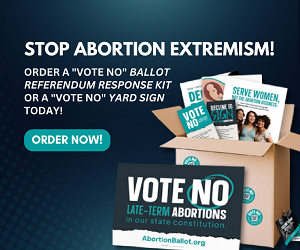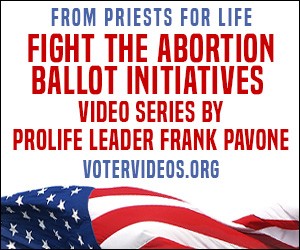In a very personal way, I could identify with a recent story in the Washington Post that discussed how routinely medical personnel speak negatively when a prenatal diagnosis suggests a child may have Down syndrome.
In 2002, I was about 21 weeks along with our second child. During a routine ultrasound, when the technician reached my son’s neck and spine, she kept checking the area and doing measurements.
My husband looked at me with a question in his eyes. He knew that because I worked at National Right to Life, I was used to seeing ultrasounds. He wanted to know if I saw anything that was wrong. I didn’t.
 But at our follow-up visit to the obstetrician, we were told that there was a chance our son, Peter, had Down syndrome. Apparently, he had a marker that was considered a strong indicator.
But at our follow-up visit to the obstetrician, we were told that there was a chance our son, Peter, had Down syndrome. Apparently, he had a marker that was considered a strong indicator.
Our doctor scheduled a visit with a group practice of perinatologists affiliated with our local hospital. We would go and have a more thorough ultrasound that could be evaluated by an expert.
We were upset, naturally, and worried about short- and long- term decisions we would have to make about our son’s care, if he had Down’s. We told our 3 1/2 year-old daughter, who was very much looking forward to having a baby brother, that he might be very special.
But through it all, there was never any question or reservation about the course of action. Peter was our little boy whom we would love no matter what.
On that first visit, a technician led us down the hall to a spacious ultrasound room. One of the perinatologists came in and, using the ultrasound machine, captured images of the area in question.
He then explained that the indicator was definitely on the borderline and strongly suggested we schedule an amniocentesis.
I flatly refused. I didn’t even need to look at my husband; I knew he would agree with me. It had taken us four years before we were able to have Gabrielle. Two years later, I had a miscarriage. There would be four years between Gabrielle and Peter.
An amniocentesis would only have been used to confirm or eliminate the diagnosis, but at the same time it increased the chances of a miscarriage. I wasn’t about to risk my baby’s life just to satisfy rampant curiosity. If he had a condition that could have been treated while in utero and an amniocentesis would help with diagnosis, then that would have been different.
The doctor did not easily give up. He tried to use statistics to convince me that my chances of having a baby with Down syndrome were on the high side. I didn’t argue with him. I knew he was trying to scare me.
I discovered that the “marker” everyone was concerned about was the thickness of the “nuchal folds.” What are nuchal folds, you ask, and why was that important? (I had the same question and I spent two years in college as a biology major before changing my major to communications.)
“Nuchal folds” is the term for the skin on the back of the neck. The perinatologist told us that if he saw a patient whose baby had nuchal folds that were 7 1/2 or 8 millimeters, it was almost a given that the child would have Down syndrome.
That’s how strong of an indicator it is. Peter’s numbers were borderline.
The doctor then explained that, depending on the results, some couples prefer to “terminate the pregnancy.” (He obviously hadn’t checked the employment line on my patient questionnaire.)
We were angry that someone would even suggest we might want to “get rid of” our child, as if he were broken. But having been through this, it is very easy for me to understand how parents could be intimidated, subtly or otherwise, into aborting their child. On that very unpleasant note, our meeting ended.
Since we refused the amniocentesis, we instead went back for repeated visits. We spent over two months not knowing and just going on faith that – – no matter what – – we would be able to handle whatever happened, with God’s grace. Around 32-33 weeks, another perinatologist with the same practice suddenly pronounced Peter free of any markers for Down syndrome!
CLICK LIKE IF YOU’RE PRO-LIFE!
We would not have aborted Peter regardless. But how many children’s lives have been taken based on faulty diagnoses? How many were aborted following an accurate diagnosis, because (as the Post story notes) obstetricians “focused on the hardships ahead and ignored ‘the positive potential of people with Down syndrome’”?
You can’t abort patients and consider that a cure for a condition or a disease. Unfortunately, it seems all too many in the medical community see it as just that way.
LifeNews.com Note: Laura Echevarria is a LifeNews.com opinion columnist. She is the former Director of Media Relations and a spokesperson for the National Right to Life Committee and has been a radio announcer, freelance writer active in local politics.







